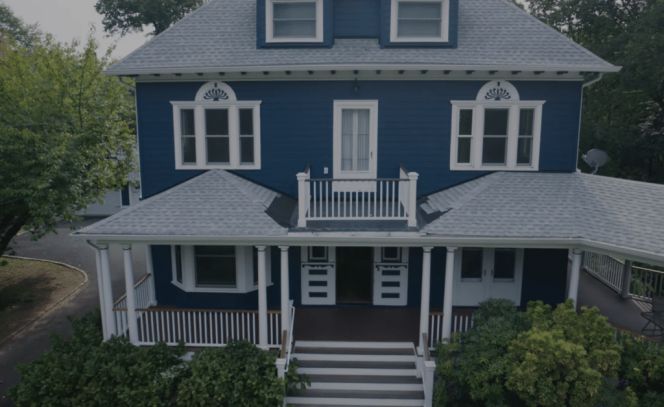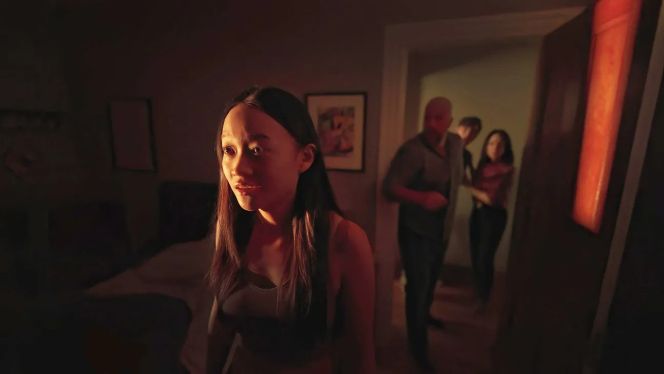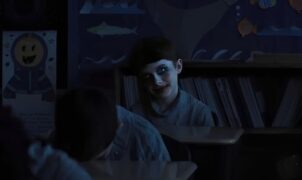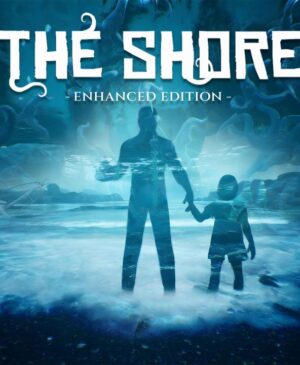MOVIE REVIEW – Presence explores the unraveling of a dysfunctional family through the eyes of an unseen entity. Steven Soderbergh’s direction proves that the story of these parents and their children would be just as gripping even without the supernatural layer.
Steven Soderbergh’s Presence is an ambitious and immersive ghost story that, paradoxically, doesn’t even need its ghost to be effective. The entire film unfolds through the perspective of an invisible presence drifting through the house, but what truly grips the audience isn’t the supernatural—it’s the slow-burning implosion of a fractured family. If Soderbergh and veteran screenwriter David Koepp (Jurassic Park, Panic Room, Mission: Impossible) had chosen to tell this story through more conventional means, it would still pack the same emotional punch.
A House That Sees Everything
Presence takes place entirely within the walls of a grand, century-old home in an unnamed American suburb. (It could just as easily be situated next to the house in Here, the similarly high-concept Tom Hanks-Robin Wright project.) Soderbergh—who also serves as the film’s cinematographer and editor—places the viewer inside the consciousness of an unseen force, gliding through the home in fluid, hypnotic tracking shots, with fade-to-black transitions marking the passage of time. (The eerie precision of the visuals almost makes it feel like Hitchcock himself is operating the camera.)
The opening sequence allows the ghost to roam freely through the empty house, inviting the audience to soak in its dark wooden paneling, the warm and open kitchen, the grand staircase leading to the upstairs bedrooms, and the picturesque view from the living room windows. The house is on the market, and Julia Fox makes a brief but dynamic cameo as the sharp-tongued real estate agent who wastes no time in closing the deal with the first potential buyers to walk through the door.
It’s the family’s fiercely determined matriarch, Rebekah (Lucy Liu), who makes the final decision, largely because the house is located in an excellent school district—ideal for her golden-boy son, Tyler (Eddy Maday), a competitive swimmer. From the start, it’s clear that Rebekah’s husband, Chris (Chris Sullivan), is little more than an afterthought in her world. Even more glaring is her blatant favoritism toward Tyler over their daughter, Chloe (Callina Laing), a sensitive teen still reeling from the loss of her best friend to a drug overdose.
Secrets, Lies, and Family Dysfunction
It doesn’t take long to realize that this is one seriously messed-up family. Rebekah has a high-stakes finance job, and it seems increasingly likely that she’s engaged in some less-than-legal dealings—something she justifies by telling herself that she’ll do whatever it takes, ANYTHING, to ensure her son’s success. Chris, meanwhile, is cracking under the strain of a household that barely acknowledges him. Rebekah’s indifference toward him is palpable, Tyler’s entitled arrogance borders on cruelty, and Chloe is slipping further into emotional free fall. (In one telling moment, Tyler shares what he thinks is a hilarious bullying anecdote—making it clear that Rebekah actively enables his worst impulses. Chloe is visibly repulsed by her brother, and Chris? He’s a spineless doormat who lets Rebekah steamroll him because he’s always felt like she was out of his league.)
Screenwriter David Koepp—who previously collaborated with Soderbergh on the equally claustrophobic but brilliant Kimi (2022)—masterfully weaves in small, revealing details about the family’s dynamic. One particularly damning one? They never cook. Every single meal comes from takeout containers. Chloe is the first to notice something strange in the house and soon convinces herself that the ghost might be the lingering presence of her late best friend.
At first, the spirit seems to be toying with her—moving small objects in her room, shutting doors, shaking furniture as if a minor earthquake has hit, even exhaling cold air onto her skin. But then, something shifts. The ghost’s presence becomes protective, especially when Chloe starts seeing Ryan (West Mulholland), a brooding yet charming athlete who repeatedly assures her that she’s in control of their relationship—while subtly manipulating her in increasingly insidious ways. And the ghost is not having it.
What’s Really Scary Here?
By this point, you might be wondering: how can a film be truly terrifying when everything is seen from a ghost’s perspective? Presence does deliver a handful of effective jump scares—including one truly spine-chilling moment late in the film—but the more we come to understand the ghost (and yes, somehow, we do feel like we come to know it), the more we empathize with it.
Like the Beast in Beauty and the Beast or the Phantom in The Phantom of the Opera, this entity is a tragic antihero, forever trapped in limbo, observing a modern American family that should be thriving but is instead disintegrating before its very eyes. That, in the end, is the real horror of Presence.
–Gergely Herpai “BadSector”–
Presence
Direction - 7.6
Actors - 7.2
Story - 7.1
Visuals/Music/Sounds - 7.1
Ambience - 7.5
7.3
GOOD
Presence is an unconventional, hypnotic ghost story where the supernatural is merely a tool to magnify the weight of human dysfunction. Steven Soderbergh’s direction and David Koepp’s script strike a delicate balance between psychological drama and horror. This isn’t a typical fright fest—it’s something far more unsettling: an eerie, emotionally unsettling experience that lingers long after the credits roll.


















Leave a Reply